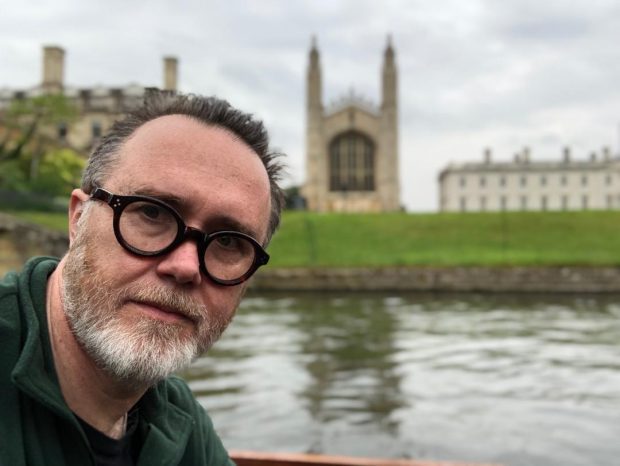Dreher For Brits

Woke up this morning in Brussels, where I will be giving a Live Not By Lies talk in a few minutes, to find that Sebastian Milbank has written a generous piece about me in The Critic, introducing me to British readers. Here’s an excerpt:
I asked him how he reconciles his scepticism of authority, and the idolatry of family and place, with Orban’s Hungary, and nationalism in general. Dreher replied he was a “reluctant nationalist”, but “believes nations are important”. His defence of nationhood is not triumphalist, he suggested, but essentially conservative, praising the diversity of cultures in Europe, and opposed to what he calls “the McDonaldisation of Europe”, arguing that America has been turned into a “shithole” by relentless capitalism.
His perspective on state power is realist — it is always going to exist, and if it isn’t used to defend basic natural goods like the family, or religious faith, it will be wielded by those who are their relentless enemy. And if he’s sceptical of traditional authority, he’s even more wary of the panglossian narratives of modern liberalism. He’s determined to break the taboo on the right against using political levers to restrain the power of big business.
But having made the improbable leap from America to Continental Europe, can Dreher be translated into a British milieu? In some ways he’s utterly at odds with traditional English sensibilities. He’s disarmingly open, fluently and earnestly laying out his life story over the course of our conversation.
His religiosity, for all its fascination with Europe and tradition, is very American: apocalyptic and with a passionate, personal relationship with his saviour which he describes as “an active life-changing relationship with Jesus Christ”. There’s more than a touch of revivalist preacher to Rod.
But here is something we’ve lost: passionate self-expression and apocalypticism were once defining features of many religious communities in this country, and those passions still quietly burn away in the pages of Milton and Blake. His influence is already being felt in Britain, as I learned when I spoke to Daniel French, an Anglican priest and one of Dreher’s English supporters.
French believes that the shock of the pandemic, in which many ordinary Anglicans were horrified by the bishops’ willingness to close churches, and their increasingly managerialist agenda for the Church, has helped generate an appetite for something very different.
With the establishment apparently blind to, or complicit in, the dwindling of British Christianity, French believes The Benedict Option presents an alternative that meets the scale of the crisis: “It is naive to think that change in Christian fortunes is just one revival tent away. The Benedict Option points rather to our corporate journey out of exile requiring several generations of introspection.” Conservatism and Christianity alike may have to accept some time in the wilderness if they’re to recapture their soul, and to truly revive.
According to Daniel French there is an increasingly “underground” aspect to conservative Christian life in the UK — believers have woken up to the fact that the culture is against them, and in many cases even traditional religious leaders too.
Another of his UK allies, Dr James Orr, believes that Rod Dreher is destined to have a significant impact on our conservatism. “His insights are proving more salient with every week that passes, not only for Christians but for all those who are beginning to feel the consequences of rejecting the West’s Christian inheritance.
“As hyper-progressivism continues to colonise the UK public square with neuralgic imports from the US culture wars, I predict that more and more people in the UK will start to take Dreher’s jeremiads seriously and pay attention to his constructive proposals.”
Whether or not James Orr is right, Dreher is interesting not just for who he is, but for what he represents. He stands at a newly emergent nexus of traditional European conservatism, English realism, and American romanticism and religiosity. With an increasingly sterile politics, caught between technocratic centrism and the hollow battles of the culture wars, there’s a desperate need for new ideas, and fresh approaches. This is a man worth listening to.
About the “shithole” comment. I made it with conscious reference to Donald Trump’s controversial remark about “shithole countries” of the Third World. I love America, but I do not love what America has become, thanks to radical individualism and a marketplace culture that valorizes desire. Our capitalism-über-alles stance has allowed us to buy and sell human life, and the mechanism for creating human life (e.g., surrogacy, IVF clinics that create hundreds of embryos), and is now allowing, even mandating, the deliberate destruction of the human in children, for the sake of allowing them to create a gender identity of their choosing. It doesn’t make you a socialist to oppose that; it just makes you a Christian who believes that God is greater than the market, and that facilitating choice is not the summum bonum of social and political life.
There’s a minor error of location — Sebastian has me living in DC at a time when I was actually living elsewhere — but overall it’s a lovely piece, and I’m grateful for his interest in my work. I am also grateful for the kind things that Father David French and Dr. James Orr said about me to Sebastian.